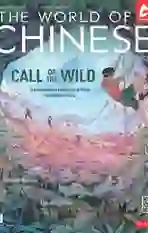野
2021-09-05

A character that is far-seeing and untamed
不负春光,野蛮生长
One morning circa 786 CE, upon seeing weeds thriving in the fields, 15-year-old Bai Juyi (白居易), later one of Chinas most renowned poets, praised the unrelenting life and energy of wild plants in his poem Farewells on Grassland (《賦得古原草送别》): “Wildfire cannot burn it completely; when spring winds blow, it lives again (野火烧不尽,春风吹又生 Yěhuǒ shāo bú jìn, chūnfēng chuī yòu shēng).”
The prototype of the character 野 (yě), meaning “wild,” first appeared over 3,000 years ago on oracle bones. The form of the character was self-explanatory, combining 林 (lín, trees) and 土 (tǔ, land) to indicate a vast tract of wooded land. The character changed its form as 野 in the Han dynasty (206 BCE – 220 CE): On the left side is 里 (lǐ, village), which conveyed the meaning, and on the right side 予 (yǔ, give), which indicates the sound of the character. This changed from yǔ to yě over time.
The character 野 generally refers to the backcountry or wilderness. People living in isolated forests and other remote areas were called 野人 (yěrén, wild people), which later evolved into a pejorative term for uneducated and ill-mannered people. Therefore, 野 now has the meaning of rudeness, as indicated in terms like 粗野 (cūyě, violent), 撒野 (sāyě, to run riot), and 野蛮 (yěmán, barbaric).
The wilderness is difficult for humans to control. Thus, the character 野 also took on the connotation of lacking restraint. For instance, an untamed nature is 野性 (yěxìng), and wild ambition is 野心 (yěxīn), a term describing zealous people desperate for fame and power and also referring to those who have grandiose schemes for success, as in: “Young people should have wild ambitions to achieve a better future (年轻人就应该有野心,才能成就更好的未来 Niánqīngrén jiù yīnggāi yǒu yěxīn, cáinéng chéngjiù gèng hǎo de wèilái).”
Any creature or plant that grows naturally without being cultivated or cared for by humans can have 野 grafted onto them. There are 野花 (yěhuā, wild flowers) and 野草 (yěcǎo, weeds), and wild animals like 野兔 (yětù, hare), 野鸡 (yějī, pheasant, literally “wild chicken”), and 野猪 (yězhū, wild boar). Large animals living in the wild, like tigers, are collectively called 野兽 (yěshòu, wild beasts).
Offering a break from the urban hustle and bustle, nature boasts a lot for humans to explore and enjoy. For instance, backcountry camping (野营 yěyíng) is an ideal way to relax in the outdoors (野外 yěwài)—or perhaps youd rather have a picnic (野餐 yěcān) and enjoy the beauty of nature (野趣 yěqù). But dont touch or eat 野味 (yěwèi, wild game), which may be a virus vector.
The line between the governing and the governed also lay in 野. In ancient China, the court and its officials were called 朝 (cháo) while common people were 野 (yě), a usage traced back to the Han dynasty, as in The History of the Late Han Dynasty (《后漢书》) that laments the destiny of Du Qiao (杜乔) and Li Gu (李固), upright officials who were framed as usurpers and died in prison: “由是海内叹息,朝野瞻望焉 (Yóushì hǎinèi tànxī, cháoyě zhānwàng yān, The whole country lamented [the deposal of Li Gu] and the court and people were waiting with anticipation to see whether or not Du would surrender to those treacherous officials).” Likewise, unofficial records of history were known as 野史 (yěshǐ), as compared to authorized 正史 (zhèngshǐ, official history) by court-appointed historians.
Similarly, in modern times, 朝 relates to the government, while 野 indicates something non-governmental. Headlines might say, “Both the officials and the people were shocked when the news broke (消息传出,朝野一片哗然 Xiāoxi chuánchū, cháoyě yípiàn huárán).” The ruling party of a multi-party state is called 执政党 (zhízhèngdǎng), while its opposition parties are 在野党 (zǎiyědǎng).
Compared to the concrete urban jungle, wildernesses are often seen as vast and spacious. Thus, the character 野 has also come to mean “space” or “range” as in 视野 (shìyě, outlook). Thus, teachers might encourage their students to “broaden their horizons (开阔视野 kāikuò shìyě).” From the untamed wilderness, to uninhibited ambition, to charting new frontiers, 野 is a character that will take you out of your comfort zone. – Huang Weijia (黄伟嘉) and Yang Tingting (杨婷婷)
